The 11th World Peace Forum, organized by Tsinghua University and co-organized by the Chinese People's Institute of Foreign Affairs, opened in Beijing on Sunday, July 2, 2023. China's Vice President Han Zheng delivered a keynote speech at the opening ceremony.
The forum took on the theme of "Stabilizing an Unstable World through Consensus and Cooperation." Liu Jianchao, minister of the International Department of the Central Committee of the Communist Party of China (CPC), delivered a speech at the lunch meeting.
Dilma Vana Rousseff, president of the New Development Bank (NDB) and former president of Brazil, Igor Ivanov, president of Russian International Affairs Council and former secretary of the Security Council of Russian Federation, and Hassan Wirajuda, former minister for Foreign Affairs of the Republic of Indonesia, as well as more than 400 attendees including diplomatic envoys from various countries in China, experts, and scholars, participated in the forum. Wang Chao, president of the Chinese People's Institute of Foreign Affairs, chaired the first plenary meeting.
Secretary of the CPC Tsinghua University Committee Qiu Yong attended the opening ceremony. Wang Xiqin, president of Tsinghua University and chairman of World Peace Forum, addressed the opening ceremony, hosted by Wang Hongwei, vice president of Tsinghua University. Yan Xuetong, secretary general of World Peace Forum, attended the forum. Jiao Yang, head of the 53rd Central Guidance Group for Themed Education on Studying and Implementing Xi Jinping Thought on Socialism with Chinese Characteristics for a New Era and former secretary of the CPC Fudan University Committee, Zhang Zongming, deputy head of the guidance group and second-level inspector of the Department of Personnel of the Ministry of Education, along with Zhu Guizhi and Dang Wanjiao, members of the guidance group, were invited to participate in the forum.
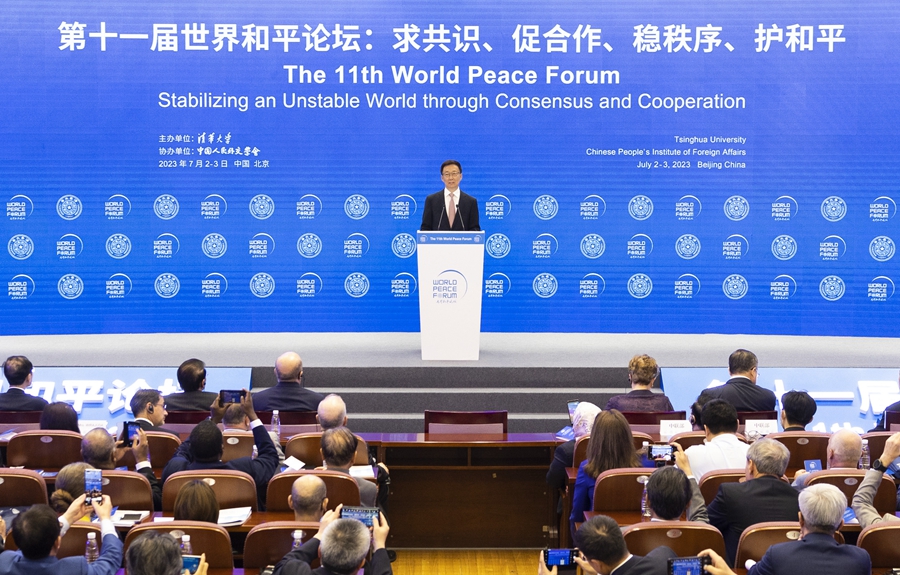
In his keynote speech at the opening ceremony, Han Zheng called on all sides to safeguard world peace and security.
Han said that in the face of profound changes in the international situation, China has put forward a series of major initiatives, such as the Global Development Initiative, the Global Security Initiative, and the Global Civilization Initiative, constantly enriching the connotation and practical path of the concept of building a community with a shared future for humanity, and injecting strong positive energy into world peace and development.
China is ready to work with other countries to safeguard world peace and security, seek global development and prosperity, advocate exchanges and mutual learning among civilizations, and share the fruits of human development, security, and civilization, Han said. He put forward four suggestions.
Firstly, he called for upholding independence and mutual respect, supporting all efforts to independently explore the path of democratic development, and respecting the exploration of the path of value realization by people in different countries.
Secondly, he stressed resolving conflicts through dialogue and consultation. The international community, especially influential major countries, should take a clear stand to promote peace talks and mediation in light of the needs and aspirations of the countries concerned so as to build mutual trust, resolve disputes and promote security through dialogue, Han said.
Thirdly, he urged firmly upholding and practicing multilateralism to make global governance more just and equitable.
Fourthly, Han called on all sides to promote inclusiveness, mutual benefit, and win-win results. "We should work together to usher in a new stage of balanced, coordinated, and inclusive global development, promote international development cooperation, improve the well-being of the people of participating countries, and consolidate the social foundation for world peace," he said.
Han stressed that Chinese modernization follows the path of peaceful development, and China will unswervingly advocate, build and uphold world peace.
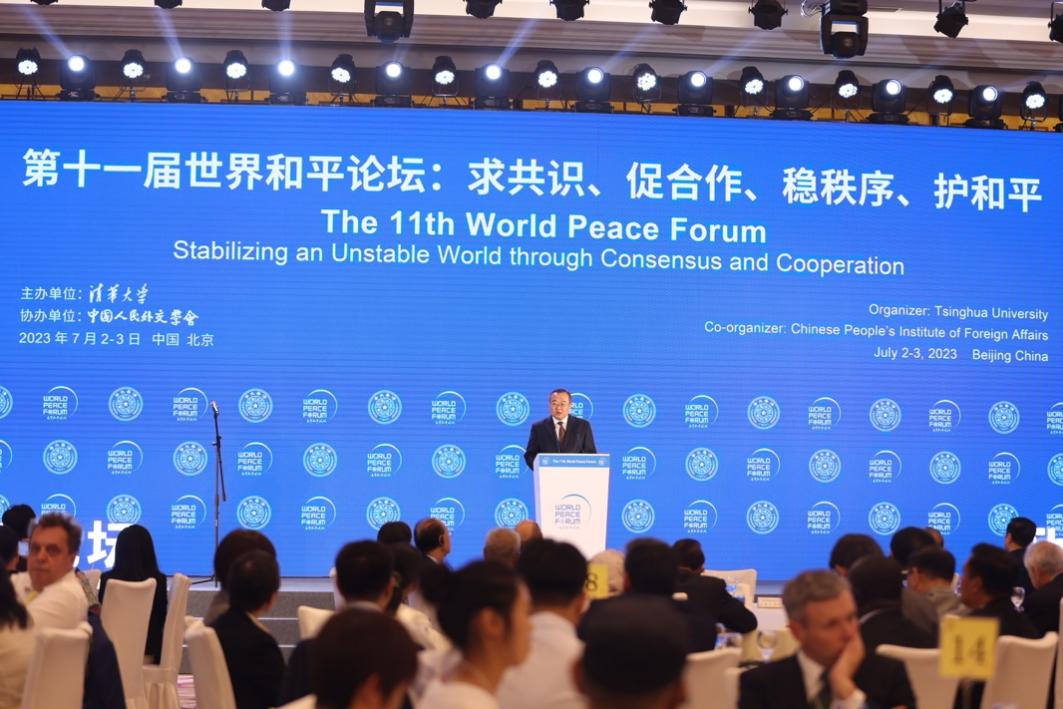 In his speech at the lunch meeting the same day, Liu Jianchao expanded on the keyword "peace" and shared his perspectives and insights with both domestic and international guests.
In his speech at the lunch meeting the same day, Liu Jianchao expanded on the keyword "peace" and shared his perspectives and insights with both domestic and international guests.
Peace has always been the shared aspiration of nations worldwide, Liu said. However, even today, humanity has not been able to break free from the historical cycle of war and peace. "Long-lasting peace and universal security remain scarce and highly sought-after."
Especially in the context of shifting profound changes unseen in a century, the international community faces increasing instability, uncertainty, and insecurity. The need for consensus, cooperation, stability, and peace on a global scale remains a task with heavy responsibility, Liu noted.
In his speech, Liu highlighted the inherent peaceful nature of the Chinese nation, which has established a long-standing foundation for peaceful development of the country. "In the new era, General Secretary Xi Jinping has stood at the height of the future and destiny of all mankind, focusing on maintaining world peace, promoting common development, and promoting exchanges and progress among civilizations. He has successively put forward several major initiatives and propositions, including the concept of building a community with a shared future for mankind, as well as the Global Development Initiative, the Global Security Initiative, and the Global Civilization Initiative, which collectively shape the worldview and peace-oriented philosophy of the Communist Party of China.
Liu emphasized that illuminating the light of world peace is a collective endeavor of all humankind. He called for all parties to focus on common development and the establishment of a solid material foundation for peace, emphasize universal security to create the wings of peace and security, and promote cultural exchanges and mutual learning to strengthen the foundation of peace through civilization.
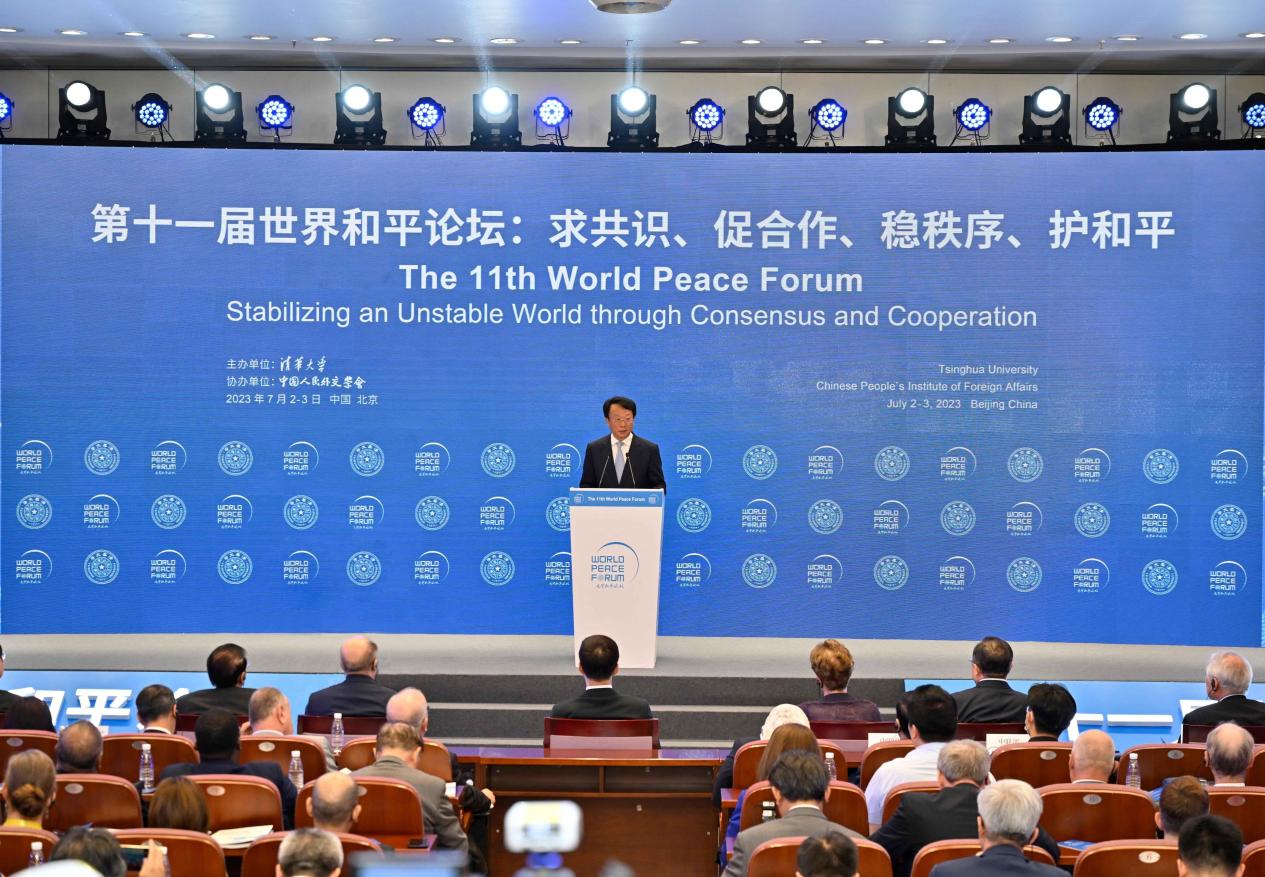
Wang Xiqin extended a warm welcome to the attendees and expressed gratitude to all those who have consistently supported the forum. He noted, "Those who share the same aspirations are not deterred by distance." In the past 11 years, the forum has become a major platform, playing an important role in promoting exchanges and cooperation in the realm of international security, he said.
The theme of this forum, "Stabilizing an Unstable World through Consensus and Cooperation," aligns with the current needs and aims to contribute to the establishment of a world that is characterized by lasting peace, universal security, shared prosperity, openness, inclusiveness, and environmental beauty, Wang said.
He affirmed that Tsinghua University will continue to make utmost efforts to sustain the forum's global impact, actively address major security challenges faced by the international community, and play an important role in building a community with a shared future for mankind and a global community of security for all.
He encouraged attendees to engage in open and candid discussions, freely express their thoughts, and strive to seek common ground and promote extensive cooperation. Amid complex and diverse circumstances, he also emphasized the importance of offering constructive proposals for stabilizing the international order, safeguarding world peace, and contributing thoughts and wisdom to enhance mutual learning and cooperation among different civilizations.
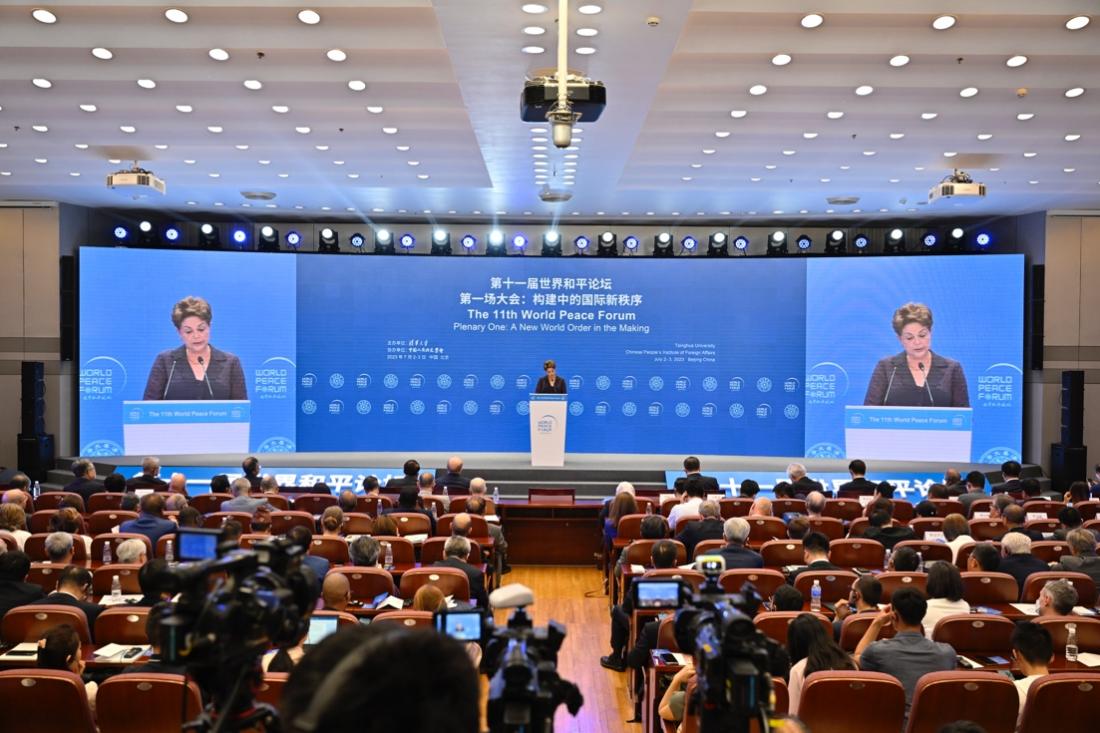
At the plenary session themed "A New World Order in the Making" held in the morning following the opening ceremony, Dilma Vana Rousseff said the world today is facing multiple crises including the climate crisis, economic recession, protectionism and geopolitical conflicts. She called on all parties to promote inclusive and sustainable development, aiming to create an environment of shared prosperity and peace for people across nations.
Rousseff emphasized the need for collective action in reforming global governance to address the fractures within globalization, and counteract protectionism and unilateralism. She urged all parties to seek consensus on the basis of shared prosperity, condemning any form of "unipolar model," and working towards cooperative and mutually beneficial outcomes.
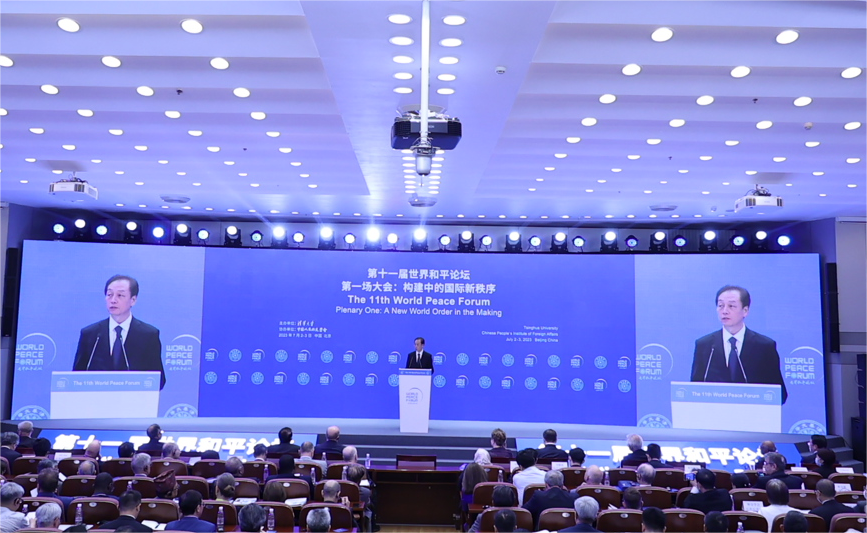
When presiding over the first plenary session, Wang Chao emphasized that the world is experiencing profound changes unseen in a century. "The international landscape is marked by a mix of intertwined, turbulent and changing complexities, including a slowdown and imbalanced development of global governance order, a resurgence of the Cold War mentality, the rise of hegemony, unilateralism, and protectionism, intensified competition and confrontation among major powers, and a growing number of uncertainties and unpredictable factors," he noted. "At the same time, the human pursuit of peace, development, cooperation, and win-win outcomes remain steadfast, with a stronger demand from the international community for a fairer and more just global order."
As the world stands at a crucial crossroads in history, the gathering of experts to discuss "A New World Order in the Making" carries significant importance, Wang added.
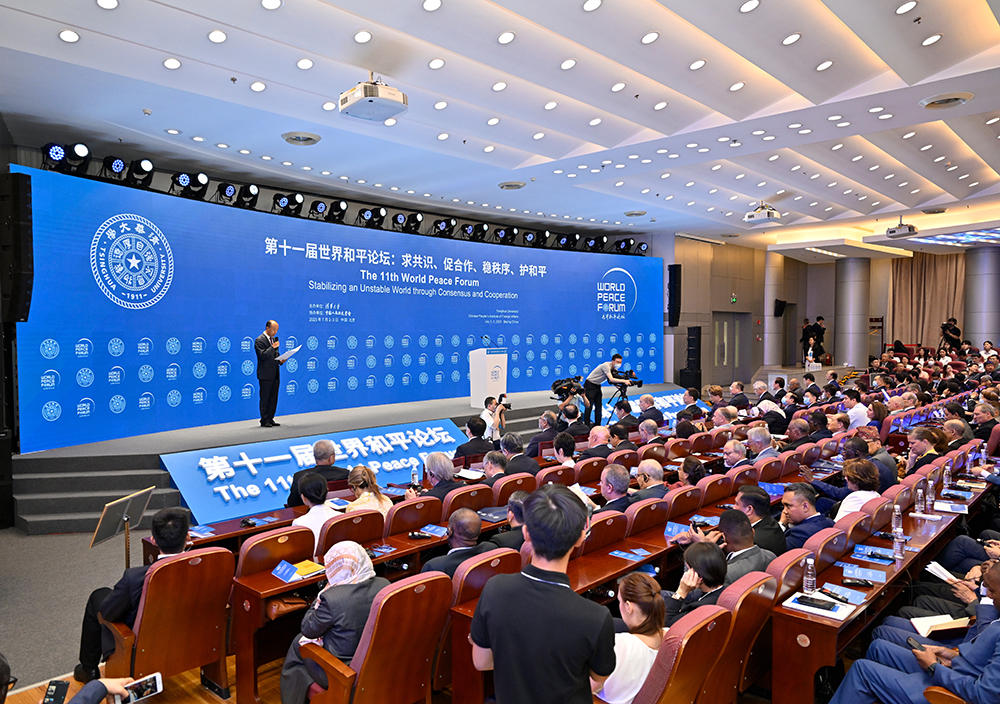
The forum comprises four major plenary sessions and 20 panel discussions and will touch on topics such as a new world order in the making, the evolution of multilateralism, major-power roles in international security, and regional cooperation in reform.
The World Peace Forum, founded in 2012, is a non-governmental annual forum on international security organized by Tsinghua University and co-organized by the Chinese People's Institute of Foreign Affairs.
Editors:John Paul, Li Han

